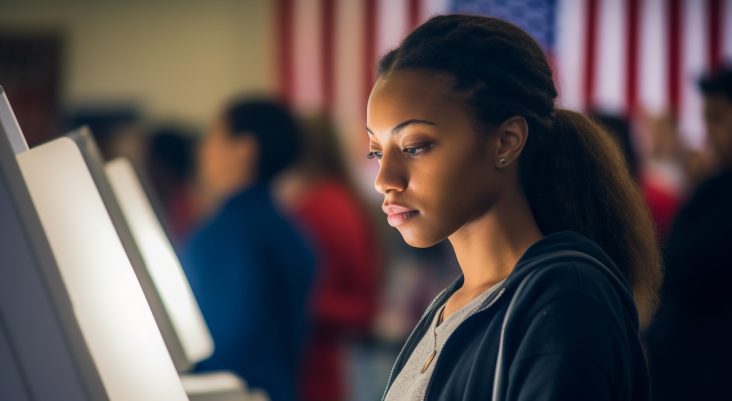Rockefeller Institute CEO: Arkansas’ low voter turnout part of bigger picture
by May 21, 2024 8:23 pm 901 views

Arkansas’ worst-in-the-nation voter registration and turnout rankings are part of a larger challenge of civic engagement that the Winthrop Rockefeller Institute and its partners are working to address.
The Institute has launched the Civic Arkansas initiative to get Arkansans involved not only in the election process but also in their communities.
Janet Harris, executive director and CEO, described what that meant during a speech Tuesday (May 21) before Rotary Club 99 in Little Rock.
“Civic engagement, when we hear that word, we often think about voting, and civic engagement is about voting, but it’s about so much more than that,” she said. “It is about the fabric of our community. It is about how we choose to show up for each other, how we choose to connect with another, how we choose to care about what is happening in the world around us and do something to create the change that we want to see.”
Harris said the roots of the initiative came from the former governor’s farewell speech at the State Capitol in 1971, when he said that “every citizen has a duty to be informed, to be thoughtfully concerned, and to participate in the search for solutions.”
Harris said Arkansans are not as well-informed as they could be in part because so many get their news from social media.
As for the second part of Rockefeller’s exhortation to be thoughtfully concerned, she said, “Well, that requires hearing a multitude of viewpoints about an issue, and sitting in the tension of the complexity of those issues in our community, instead of looking for an answer in a partisan sound byte.”
Participating in the search for solutions requires time, space and intentionality, she said.
The Civic Arkansas initiative is in effort to help Arkansans find those solutions. The Institute scheduled four local listening sessions this month in Clinton, West Memphis, Arkadelphia and Conway.
Prior to that, it helped create the Arkansas Civic Health Index Report to establish a baseline measurement of the state’s civic health. The report was developed in partnership with the National Conference on Citizenship, the Clinton School of Public Service, and Engage Arkansas, an initiative to advance civic engagement. It was released in December.
The report used as its source material the U.S. Census Bureau’s Current Population Survey of 60,000 households across country.
The report found that Arkansas is 51st in voter registration and turnout. In the 2020 presidential election, 54% of Arkansans voted, compared to a national average of 66.8%.
Harris said Arkansas voters tend to be older, white and more educated than the general population.
“A smaller and smaller segment of Arkansans are making choices about who represents us,” she said. “Fewer people are weighing in on the ballot issues that we are to choose from. Our government, our laws and our communities are slowly looking less and less like the full spectrum of Arkansas.”
In other findings, Arkansas ranked 49th in its percentage of residents who trust the federal government. Only 35% said they trust the federal government to do the right thing about half the time or more. At the same time, it ranked 30th in its trust in local officials who oversee elections.
It ranked higher in the area of donating to a charitable or religious organization. The study found that 52% of Arkansans give at least $25 annually. But it ranked 34th in its percentage belonging to any group and 42nd in volunteering, with 20.9% doing the latter compared to a national average of 23.2%.
Results were mixed in the area of social connectedness. Arkansas ranked 9th in the percentage who said they frequently spend time with family and friends. But it was 47th in working with neighbors to do something positive for the community, with only 14% reporting doing so.
“So one of the conclusions of the Arkansas Civic Health Index Report is that in simple measures of connectedness, neighborliness and giving at least some money to charitable causes, Arkansas does pretty well, but we have a long way to go to get people more involved, to give them the capacity to make choices about the future of their communities, who represents us, and how we solve problems at the local level,” she said.
Harris said leaders should consider how to create ongoing civic education experiences for people of all ages. They also should think about incentivizing participating in the search for solutions, and about what institutional flexibility is needed for creating opportunities for voting, volunteering, serving and otherwise being thoughtfully concerned. A new generation of voters, volunteers and creators is needed.
“If we don’t, we are headed toward a future where we don’t trust one another, we don’t talk to one another, our government institutions don’t reflect who we are, and we become victims of apathy and loneliness – not something that I am interested in for my state,” she said.
Harris asked attendees to consider solutions for improving civic engagement with their tablemates. After a few minutes of discussion, suggested ideas included a voter phone app letting Arkansans register and vote, dedicating a day for company employees to volunteer with state funds available for smaller companies, and a monthly statewide town hall where issues can be discussed.
